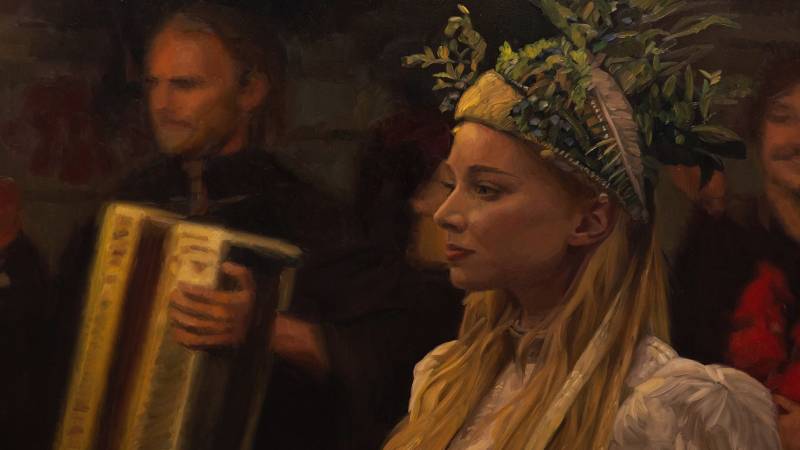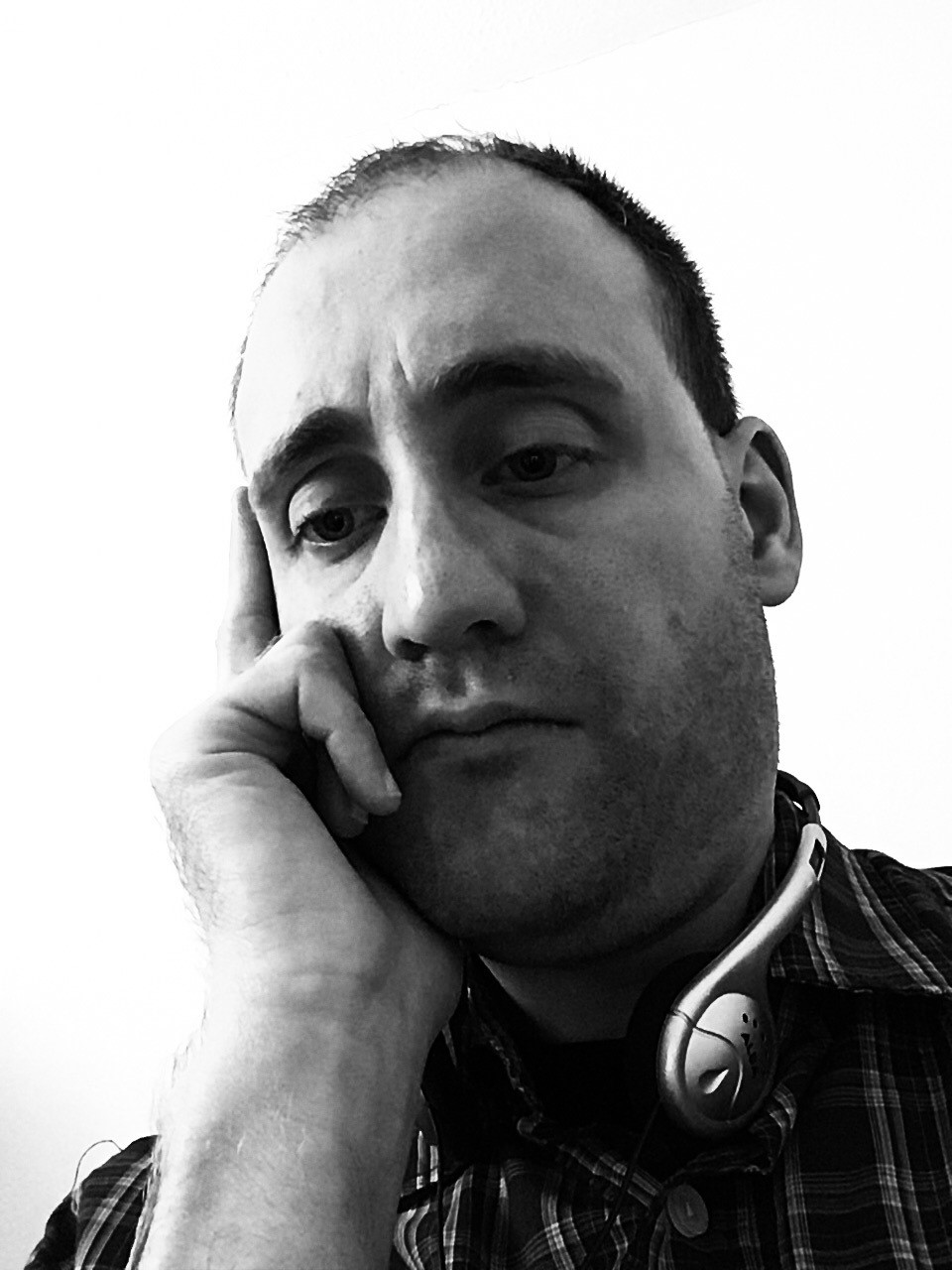




Following the visual tour deforce of film turned into an oil painting with Loving Vincent (2017), husband-and-wife filmmakers Hugh Welchman and DK Welchman (née Dorota Kobiela) return with another striking visual blend of film and painting – an adaptation of Polish author, Władysław Reymont’s four-part novel. The movie is entitled The Peasants.
Set in the late 19th century, Jagna (Kamila Urzędowska) has reached childbearing age. Her mother has promised her to wealthy farmer Maciej Boryna (Mirosław Baka), but it’s his son Antek (Robert Gulaczyk) who she desires. She agrees to marry Maciej in order to please her mother, but she can’t deny her feelings for Antek. When they’re discovered mid-coitus by Maciej, it’s only a matter of time before derogatory rumours about Jagna spread. After returning from self-exile, Antek is faced with a choice: stand by Jagna, or bow to societal conventions and disavow her.
Aesthetically stunning, The Peasants is grounded by timeless themes that explore the light and darkness within human beings. Welchman and Kobiela’s evolved their use of animation, pursuing a more realistic style compared its predecessor. Their ambition coincided with unexpected real-life events to ratchet up the challenges that Welchman, who spoke to DMovies about the making of the film, says thrust them into an uncertain struggle.
The Peasants, which is Poland’s Oscar submission, is in in cinemas across the nation on Friday, December 8th.
…
.
Paul Risker – Is animation a purer form of filmmaking?
Hugh Welchman – […] At the film school level, animation is very pure and artistic. [In film], if you’ve got a good actor or cinematographer, you can get away with [mistakes], but with animation, if it’s not drawn, animated or modelled properly, then there’s nowhere to hide. You also have more artistic possibilities with animation, in terms of expressionism, simplification and caricature.
Live action films use animation a lot now, so the lines are becoming more blurred. People doing big Hollywood films need to know how to do it, otherwise, they can’t create these big special effects in sci-fi or superhero films. These have dominated for the past ten years, but I think their time is over – it’s time for something new.
PR – If film and art are cyclical, in what ways are your films an example of this?
HW – When we were developing Loving Vincent, we were looking at Black Narcissus (Powell and Pressburger, 1947). Jack Cardiff was not only one of the greatest cinematographers of all time, but he was also an oil painter, and he recreated the Himalayas in the studio.
With Loving Vincent, we were doing something that no one had done before, and so, someone has to start somewhere. Every single frame was an oil painting, but because of the realistic style of The Peasants, each frame took twice as long. So, for Loving Vincent it was two and a half hours average time per frame, compared to five hours for this film.
For our production pipeline, we had to resurrect the old Disney studio 2D system, where we had key frame animators and in-betweeners. The oil painters became the key frame animators and then we had a team of digital painters, animators and effects artists, who were creating in-between frames out of the oil paintings. There were forty thousand frames of oil painting and from those we digitally created another forty thousand in-between frames.
PR – How do you compare the experiences of these two films?
HW – Actually we didn’t realise how hard The Peasants was going to be. On Loving Vincent, we had 113 financing meetings before we even financed the film. The hardest thing was persuading people to give us money for the crazy endeavour of painting an entire film, whereas we quickly got the funding for The Peasants.
With Loving Vincent, we had to work out how to do it – every single aspect, from the whole studio structure and painting machinations to what kind of canvas board and paints, and yet, The Peasants was three times more difficult. It wasn’t just the filmmaking, but Covid. There were two stoppages for the live action, the second time for a whole year. Many of the painters we thought were going to join us who worked on Loving Vincent couldn’t because they were coming from outside of Poland. Then we had inflation of 20% in the four countries we were making the film. The costs were just escalating before our eyes. If you make a film over three years that makes a huge difference.

The thing that almost collapsed us was the Ukraine war because one of our studios was in Kiev. We set up the studio because on Loving Vincent we had a lot of Ukrainian painters. They asked rather than them having to move and leave their families, could we set up a studio in Kiev? We loved that idea, but two months later the Russians invaded.
We had to close down the studio and evacuate all we could. We were picking up the women with their kids, sometimes with their elderly mothers, and starting them all over again in Poland. We lost our funding that we were going to get from Ukraine. From the outbreak of the war, for most of the next fifteen months, we didn’t know where the money was coming from to pay for the 100+ people that worked for us.
There was this level of anxiety and uncertainty that we never had on Loving Vincent. On that film it was the other way around – we started with nothing and were doing it bit by bit. It was a bohemian studio and an artistic adventure. With The Peasants, once we hit the ground running, we knew exactly what we were doing, but then the world changed, and we were left to try and finish the film.
PR – What was it that originally compelled you to adapt Reymont’s novel?
HW – One of the things that really drew me to this novel was it’s a tour de force. My wife gave it to me and said I had to read it. She didn’t tell me we have to make a film about it because she wanted my opinion on it before she prejudiced that. I read the book and I felt that it was the greatest novel I’d read about peasants. [Émile] Zola’s The Earth is a fantastic novel, but it’s very patronising. It’s like he parachuted into a village for six weeks, reinforced all of his prejudices about peasants, and wrote this incredibly funny but horrific and scathing account of what peasants are like.
You have to remember that peasants are the backbone of every society since the Egyptian pyramids, even further back. You’re talking about the whole of recorded history. All of our religions are peasant religions. All of our food is peasant food. We are all peasants. We think we’re so much further away from them than we are. That’s not surprising because that’s still the foundation of the cultures we’re living in. Despite incredible technological change, the fact is we haven’t moved away from that paradigm.
It’s amazing because a lot of nineteenth and twentieth century authors are obsessed with the working or middle classes trying to improve themselves, or the aristocracy or war heroes. They ignore the every people of every society, and when I read The Peasants, I felt I recognised those people from growing up in rural Hampshire. It was an amazing portrayal of the human condition.
PR – What’s striking about the novel is how we can see our contemporary world in it, suggesting as much time that passes, it seems things stay the same.
HW – We toned down the routine violence from the book. For my dad it was normal that you got caned at school. That’s how they taught people to read and write, by whacking them. It was not that long ago – a couple of generations back. I wanted to put these people up on the screen and ask, ‘Do you recognise them? How much have we actually changed?’
[…] If you look at the sexual violence Jagna experiences, there’s still a huge difference in the threats [of violence] men and women are likely to feel and then experience. Mobs are something that’s on the rise again because of the internet and social media, that allows people to anonymously gang up on people. This is what happens to Jagna, and that kind of scapegoating is unfortunately what we humans retreat to as a group.
This film is unfortunately not only relevant now, but it’s going to be relevant in two hundred years because it’s about how people are. Part of the purpose of art is to try to bring people’s attention to how we are, how it could be or what it will be if we don’t change.
…
.
Hugh Welchman is pictured at the top of this piece at the BFI London Film Festival. The second image is a still of The Peasants.
The Peasants was released in cinemas on 8th December 2023. Just click here in order to read our filthy genius movie review.





















